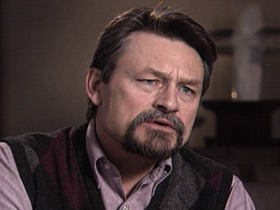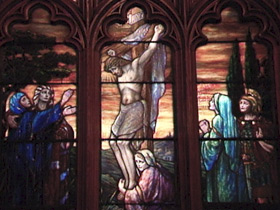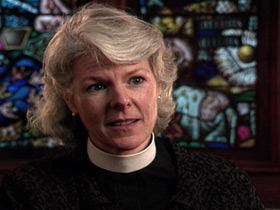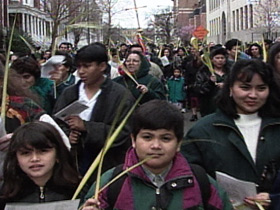Holy Week Observances
BOB ABERNETHY: Now, Holy Week, what millions of Christians believe and the many ways they remember the time in the life of Jesus from Palm Sunday through Good Friday and Easter. Kim Lawton tells the story.
KIM LAWTON: For Christians, the practices of Holy Week weave together a remembrance of the last events in the life of Jesus and a recognition of the continuing spiritual significance of those events.
Mr. WALT WANGERIN Jr. (Author, THE BOOK OF GOD): During Holy Week, our observances do the best to allow the faithful not only to think about these things but actually to experience them, experience not only with their minds and their hearts, but with their bodies and with emotions that they go through. In this way, the story becomes something very, very real to us, and we have the opportunity to be shaped [by] and to live in that story.

LAWTON: The story begins on Palm Sunday. According to the biblical account, when Jesus entered Jerusalem a week before his death, people who had thought he’d come to break the chains of Roman occupation greeted him like a conquering hero.
Mr. WANGERIN: On Palm Sunday, those who honor the entrance of Jesus into Jerusalem will actually have palms handy, remembering what Scripture says about Jesus’ entrance, that when he came, they gathered palms. They waved them in a sort of triumphal celebration.
LAWTON: But underneath the celebration, there’s an irony as well, a poignancy often highlighted by the reading of the entire Holy Week story, the story that moves from triumph to crucifixion.
Reverend BARBARA BROWN TAYLOR (Religion Professor, Piedmont College): How quickly we hail our new messiahs. How quickly we believe this person or that person will satisfy our heart’s desires and do it the way we want it done. And then how quickly we turn murderous when that turns out not to be so.
LAWTON: The final and most important observances begin on Thursday with the commemoration of Jesus’ Last Supper with his disciples. Many churches will gather for a meal, sometimes even a Passover Seder as Jesus would have celebrated. And they’ll take Communion, the Eucharist, as Jesus directed at the Last Supper. It’s often called Maundy Thursday, from the Latin word for “mandate” or “commandment.”
Mr. WANGERIN: It talks about the commandment that Jesus gave on that day, this peculiar and beautiful commandment that we should love one another as he has loved us.

LAWTON: According to the Gospel of John, Jesus demonstrated that love by washing his disciples’ feet. And so for Christians of many traditions, a central practice on Maundy Thursday is a foot-washing ceremony.
Mr. WANGERIN: This is how love shows itself, not in arrogance, but in the bending down and the taking of that which is most humble of other people and making it beautiful and clean again.
LAWTON: For many, the most sacred and somber practices take place on Good Friday, the day of the crucifixion.
Mr. WANGERIN: Called good not because it’s a joyful day in what happened, but because the consequence of that day is good. Jesus dies so that we don’t have to die a final death.
Unidentified Man #1: The third station, Jesus falls the first time.
LAWTON: Catholics in particular remember the events of Good Friday by commemorating the 14 stations of the cross.
Father JAMES PAUL (Franciscan Monastery): It’s a devotion of the way Jesus carried the cross from after his condemnation by Pontius Pilate and then carrying the cross through the streets of Jerusalem.
LAWTON: The stations reenact the scriptural and traditional route Jesus took, the stops he made, the people he encountered along the way.
Protestants will often gather in the evening in a solemn worship service that remembers Jesus’ death with the taking of Communion. One traditional service performs Haydn’s classic piece “The Seven Last Words of Christ,” interspersed with meditations.
Unidentified Man #2: He said to his mother, “Woman, behold thy son.”
LAWTON: Another traditional service for both Catholic and Protestant is Tenebrae, meaning “shadows, darkness.” Ancient psalms and prayers are sung as candles are slowly extinguished one by one, symbolizing the abandonment and death of Jesus. By now, in many traditions, the altar itself has been stripped bare; statues and crosses have been covered in purple or black cloth, the shrouds of death.

The sense of mourning carries over into Holy Saturday, traditionally the quietest day of the Christian calendar. Many churches have no services at all. Others will gather late Saturday evening in darkness for a prayer vigil that ushers in Easter. The vigil begins mournfully, but then with the dawning of Easter comes a change, the celebration of the Christian belief that Jesus rose from the dead, thereby forgiving the sins of the world and promising eternal life to those who believe.
Rev. TAYLOR: The celebrant gets to go to the cross with the candle and yank off the black shroud and say, “Hallelujah, Christ is risen, the Lord is risen indeed.” And then the organ booms and the singing begins and the lights come up and the flowers are brought in, and you feel resurrected if you’ve been through Holy Week.
Unidentified Man #3: I welcome you on behalf of the Espanola Valley Ministerial Alliance to this glorious Easter celebration.
LAWTON: Some celebrate that change in the cold and darkness of pre-dawn at an Easter sunrise service. Others celebrate Resurrection Sunday with joyous pageantry, including traditional songs of celebration sung in many churches only on this day.
Mr. WANGERIN: What we believe is that his dying and rising also can become our dying and rising. We not only realize the capacity of his love to die for us, but we begin to sense that that death changed the kinds of dyings we will have to do. Our bodies will die, but our souls will live after all.

LAWTON: For many Christians, it’s the full cycle of Holy Week, the combined range of emotion and ritual, that brings the most meaning.
Rev. TAYLOR: I just thought all hope was lost on Good Friday, and Holy Saturday I thought all hope was lost. And today, something new has happened, something completely unexpected. So it gives me a kind of holy unknowingness about what may happen tomorrow.
Mr. WANGERIN: It is probably the most important — no, it is the most important celebration that we have. This is what Jesus came to do, to die for our sins and to rise in order to declare publicly that the sacrifice was accepted. Without Easter, there is no church.
LAWTON: I’m Kim Lawton reporting.







